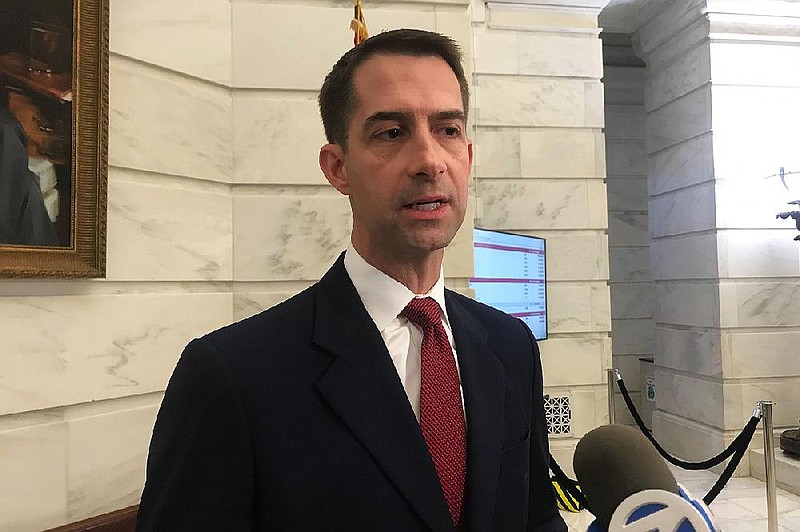WASHINGTON -- In his first appearance as a member of the Senate Judiciary Committee, U.S. Sen. Tom Cotton, R-Ark., questioned attorney general nominee Merrick Garland about his positions on the death penalty, racial equity and a special counsel scrutinizing the 2016 Trump-Russia inquiry.
The newest Republican member of the committee praised Garland for his work in prosecuting domestic terrorist Timothy McVeigh; the Oklahoma City bomber was convicted and given the death penalty for blowing up the Alfred P. Murrah Federal Building, killing 168 people.
As principal deputy associate attorney general during the Clinton administration, Garland helped bring McVeigh to justice, as well as Unabomber Ted Kaczynski, who is serving a life sentence for his crimes.
Cotton, an advocate of the death penalty, wanted to know Garland's stand on the issue now that he's President Joe Biden's pick to lead the Justice Department.
"Did Joe Biden or anyone from his administration, transition or campaign ask you not to pursue capital punishment in cases against murderers or terrorists?" the lawmaker from Little Rock asked.
"No," Garland replied.
Referring to the nominee's "outstanding work" in the McVeigh case, Cotton asked: "Do you regret the fact that Timothy McVeigh received the death penalty and has been executed?"
Garland stood by the decision.
"Originally, I supported the death penalty at that time for Mr. McVeigh and, in that individual case, I don't have any regret. But I have developed concerns about the death penalty in the 20-some years since then," he said.
[Video not showing up above? Click here to watch » https://www.youtube.com/watch?v=2mkuqFI7Lo0]
"The sources of my concern are issues of exonerations of people who have been convicted, of sort of arbitrariness and randomness of its application, because of how seldom it's applied and because of its disparate impact on Black Americans and members of other communities of color," Garland said.
Cotton asked Garland whether, as attorney general, he would allow prosecutors to seek the death penalty in a case similar to the Oklahoma City bombing perpetrated by a "white supremacist."
Garland suggested he'd follow the White House's general guidelines.
"I think it depends on what the development of the policy is. If the president asks or if we develop a policy about [a] moratorium, then it would apply across the board," he said. "There's no point in having a policy if you make individual discretionary decisions. So if that's the policy, then that would be the policy."
"The [U.S.] Supreme Court has held that the death penalty is constitutional, but it is not required. That is within the discretion of the president," Garland said.
Noting the murder of nine Black worshippers by Dylann Roof at Emanuel African Methodist Episcopal Church in Charleston, S.C., Cotton wanted to know whether Garland would allow the death penalty against a similarly situated white supremacist.
The nominee reiterated that he would follow the White House's policy regarding capital punishment.
Cotton, a Harvard Law School graduate and a former federal court clerk, announced this month that he'd been appointed to the Senate Judiciary Committee.
Last week, Sen. Charles Grassley, R-Iowa, the committee's top Republican, announced that Cotton would serve as the ranking member on the Subcommittee on Criminal Justice and Counterterrorism.
During Monday's hearing, Cotton also asked Garland about Yale University's admissions policies, arguing that they discriminate against Asians.
Garland said the Biden administration hadn't consulted with him about its decision to drop a lawsuit against the Ivy League school, saying it would have been inappropriate to weigh in before being confirmed.
He also questioned Garland about the difference between racial equality and racial equity, noting that the Biden administration had recently signed an executive order calling for the advancement of racial equity.
The executive order "defines equity as the fair and impartial treatment of every person without regard to their status," including those in "underserved communities," Garland replied.
Cotton also asked Garland about special counsel John Durham's investigation into how the Trump-Russia probe was handled.
Why not commit to giving Durham the "staff, the resources and the time" to complete his probe, Cotton said.
"I'm sitting here and I don't have any information about what he needs in his resources," Garland said. "Everything I know, sitting here, suggests that he should, of course, have those resources."
In addition to weighing attorney general nominees, the judiciary committee advises and consents on federal judges, including Supreme Court nominees.
Cotton is one of four Republicans on the committee who are frequently mentioned as potential 2024 presidential candidates; the others are Sens. Ted Cruz of Texas, Josh Hawley of Missouri and Ben Sasse of Nebraska.
On Monday, Cotton's Senate campaign announced that he'll be running digital ads in New Hampshire and Georgia opposing the nomination of Xavier Becerra as Biden's secretary of health and human services.
The ad criticizes Becerra for his handling of the covid-19 pandemic and accuses him of supporting Sen. Bernie Sanders' "government takeover of your health care."
New Hampshire traditionally holds the first presidential primary.
A campaign official said the two states were selected because they have Senate elections in 2022.
The digital ad buy is in the "mid-five figures to start," the official said.

